Product Management Quotes
Most popular product management quotes
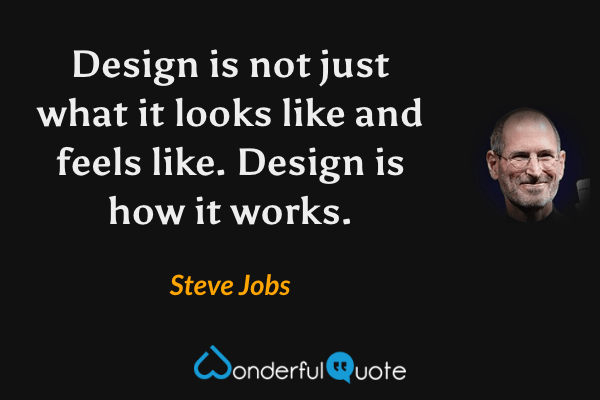
Design is not just what it looks like and feels like. Design is how it works.
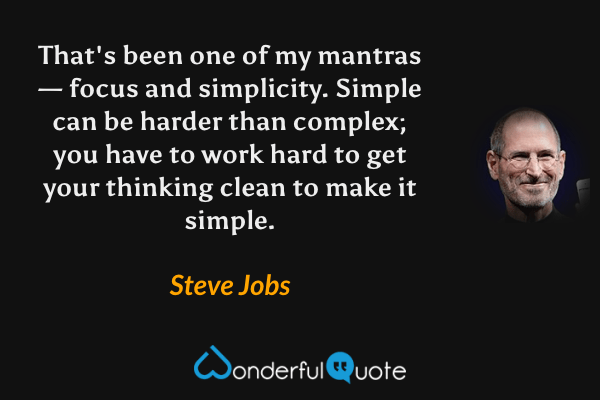
That's been one of my mantras — focus and simplicity. Simple can be harder than complex; you have to work hard to get your thinking clean to make it simple.
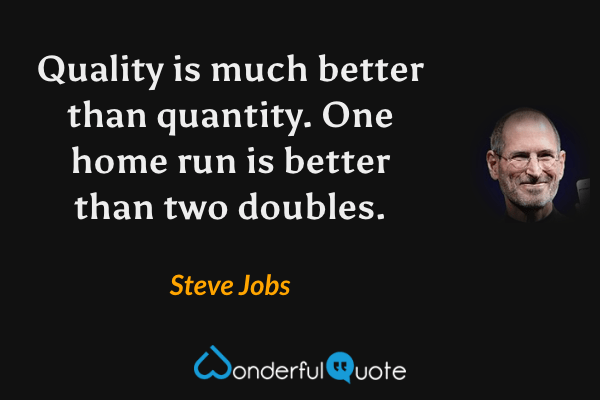
Quality is much better than quantity. One home run is better than two doubles.
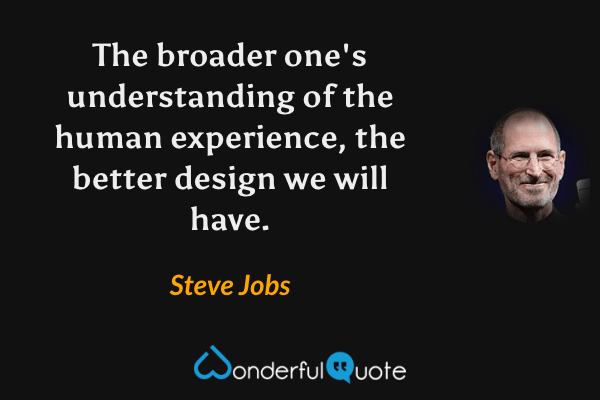
The broader one's understanding of the human experience, the better design we will have.
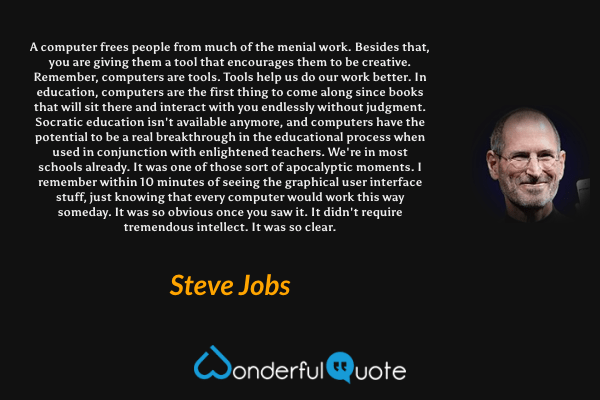
A computer frees people from much of the menial work. Besides that, you are giving them a tool that encourages them to be creative. Remember, computers are tools. Tools help us do our work better. In education, computers are the first thing to come along since books that will sit there and interact with you endlessly without judgment. Socratic education isn't available anymore, and computers have the potential to be a real breakthrough in the educational process when used in conjunction with enlightened teachers. We're in most schools already. It was one of those sort of apocalyptic moments. I remember within 10 minutes of seeing the graphical user interface stuff, just knowing that every computer would work this way someday. It was so obvious once you saw it. It didn't require tremendous intellect. It was so clear.
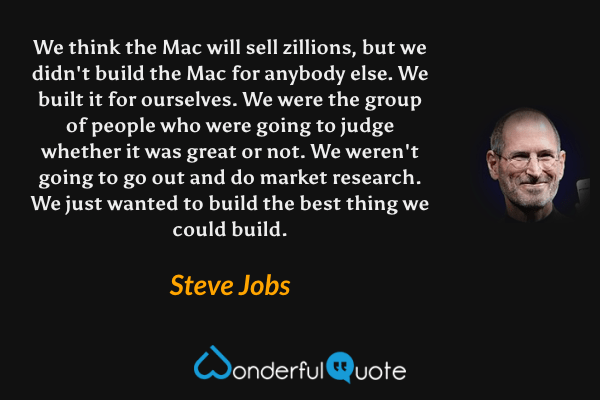
We think the Mac will sell zillions, but we didn't build the Mac for anybody else. We built it for ourselves. We were the group of people who were going to judge whether it was great or not. We weren't going to go out and do market research. We just wanted to build the best thing we could build.
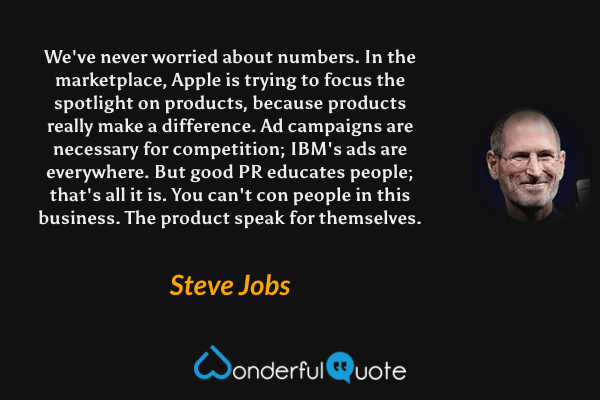
We've never worried about numbers. In the marketplace, Apple is trying to focus the spotlight on products, because products really make a difference. Ad campaigns are necessary for competition; IBM's ads are everywhere. But good PR educates people; that's all it is. You can't con people in this business. The product speak for themselves.
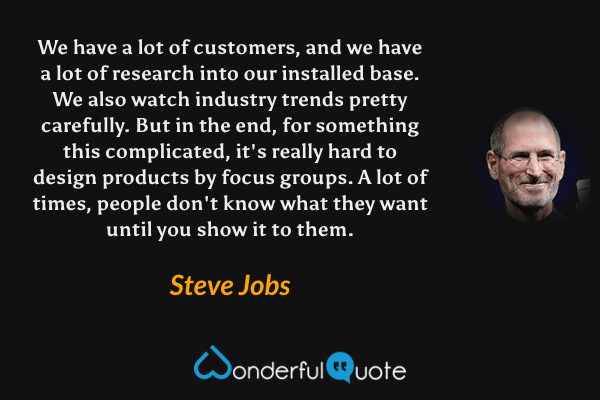
We have a lot of customers, and we have a lot of research into our installed base. We also watch industry trends pretty carefully. But in the end, for something this complicated, it's really hard to design products by focus groups. A lot of times, people don't know what they want until you show it to them.
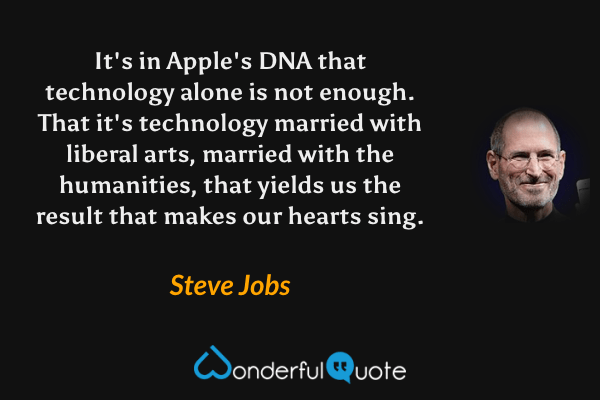
It's in Apple's DNA that technology alone is not enough. That it's technology married with liberal arts, married with the humanities, that yields us the result that makes our hearts sing.
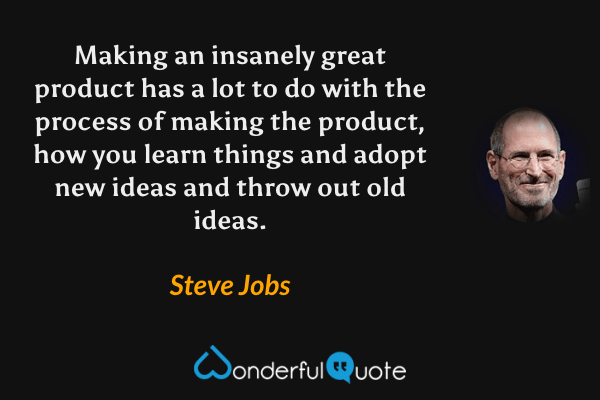
Making an insanely great product has a lot to do with the process of making the product, how you learn things and adopt new ideas and throw out old ideas.
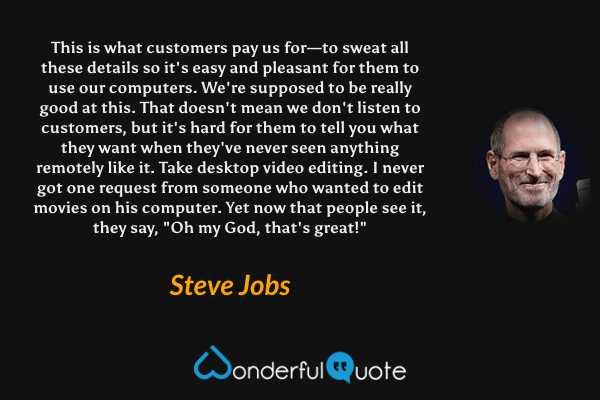
This is what customers pay us for—to sweat all these details so it's easy and pleasant for them to use our computers. We're supposed to be really good at this. That doesn't mean we don't listen to customers, but it's hard for them to tell you what they want when they've never seen anything remotely like it. Take desktop video editing. I never got one request from someone who wanted to edit movies on his computer. Yet now that people see it, they say, "Oh my God, that's great!"
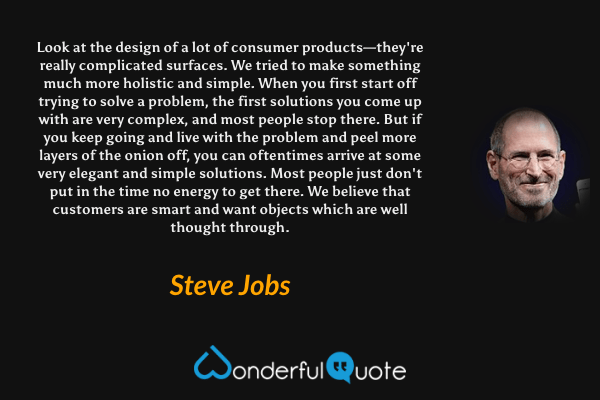
Look at the design of a lot of consumer products—they're really complicated surfaces. We tried to make something much more holistic and simple. When you first start off trying to solve a problem, the first solutions you come up with are very complex, and most people stop there. But if you keep going and live with the problem and peel more layers of the onion off, you can oftentimes arrive at some very elegant and simple solutions. Most people just don't put in the time no energy to get there. We believe that customers are smart and want objects which are well thought through.
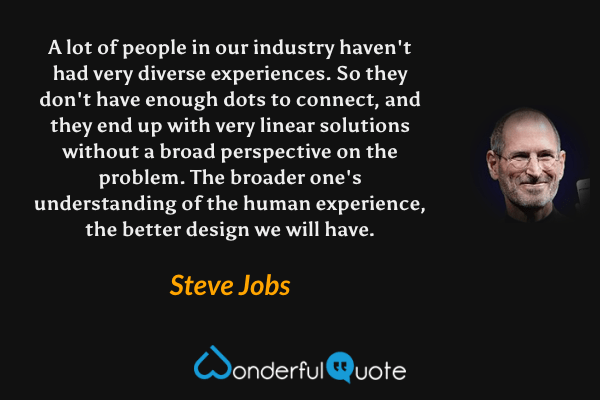
A lot of people in our industry haven't had very diverse experiences. So they don't have enough dots to connect, and they end up with very linear solutions without a broad perspective on the problem. The broader one's understanding of the human experience, the better design we will have.
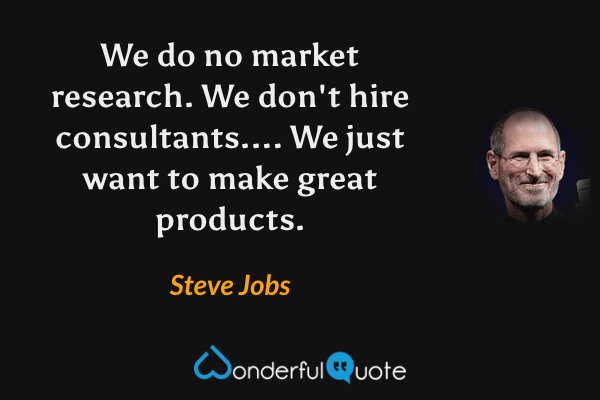
We do no market research. We don't hire consultants.... We just want to make great products.
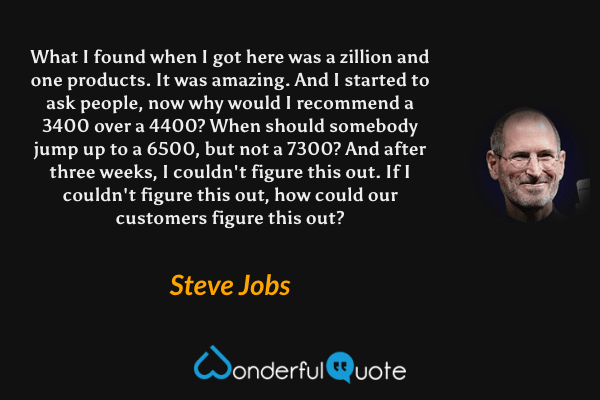
What I found when I got here was a zillion and one products. It was amazing. And I started to ask people, now why would I recommend a 3400 over a 4400? When should somebody jump up to a 6500, but not a 7300? And after three weeks, I couldn't figure this out. If I couldn't figure this out, how could our customers figure this out?
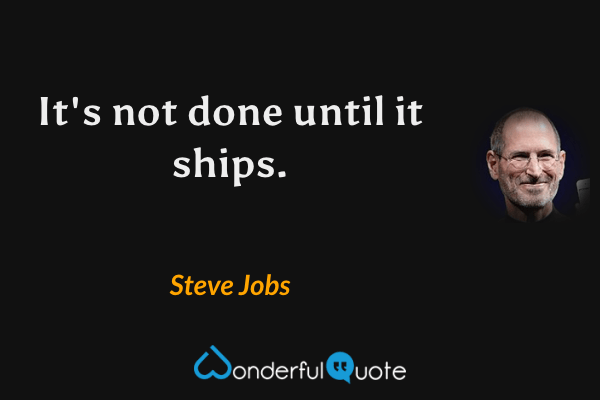
It's not done until it ships.
![I get asked a lot why Apple's customers are so loyal. It's not because they belong to the Church of Mac! That's ridiculous. It's because when you buy our products, and three months later you get stuck on something, you quickly figure out [how to get past it]. And you think, "Wow, someone over there at Apple actually thought of this!". . .. There's almost no product in the world that you have that experience with, but you have it with a Mac. And you have it with an iPod. - Steve Jobs quote.](/img/q/71/15571A-i-get-asked-a-lot-why-apples-customers-are-so-steve-jobs.png)
I get asked a lot why Apple's customers are so loyal. It's not because they belong to the Church of Mac! That's ridiculous. It's because when you buy our products, and three months later you get stuck on something, you quickly figure out [how to get past it]. And you think, "Wow, someone over there at Apple actually thought of this!". . .. There's almost no product in the world that you have that experience with, but you have it with a Mac. And you have it with an iPod.
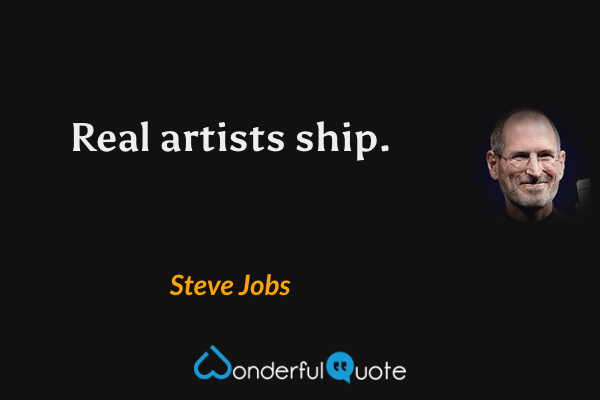
Real artists ship.
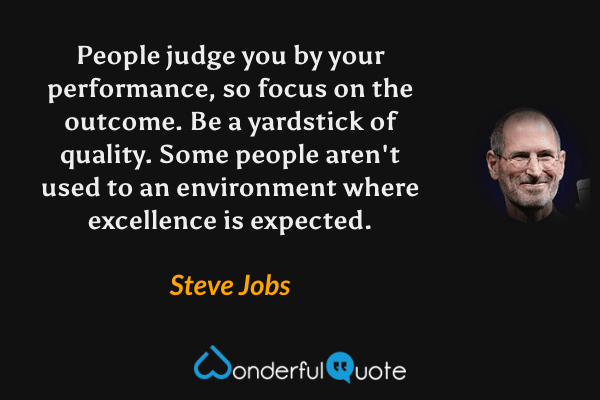
People judge you by your performance, so focus on the outcome. Be a yardstick of quality. Some people aren't used to an environment where excellence is expected.
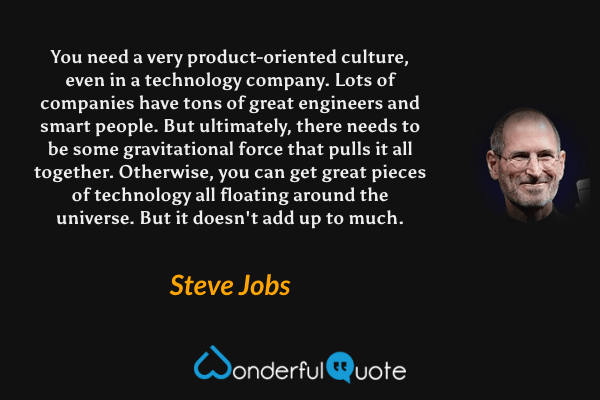
You need a very product-oriented culture, even in a technology company. Lots of companies have tons of great engineers and smart people. But ultimately, there needs to be some gravitational force that pulls it all together. Otherwise, you can get great pieces of technology all floating around the universe. But it doesn't add up to much.
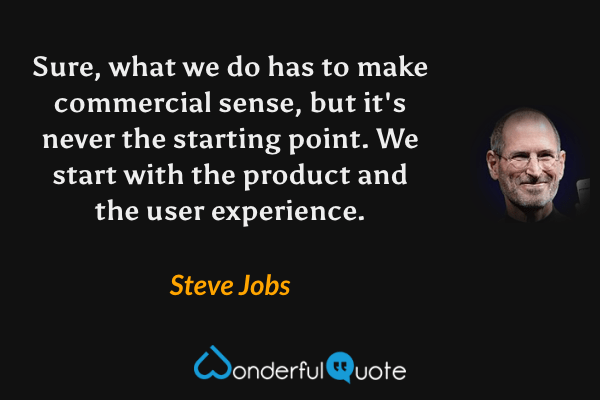
Sure, what we do has to make commercial sense, but it's never the starting point. We start with the product and the user experience.
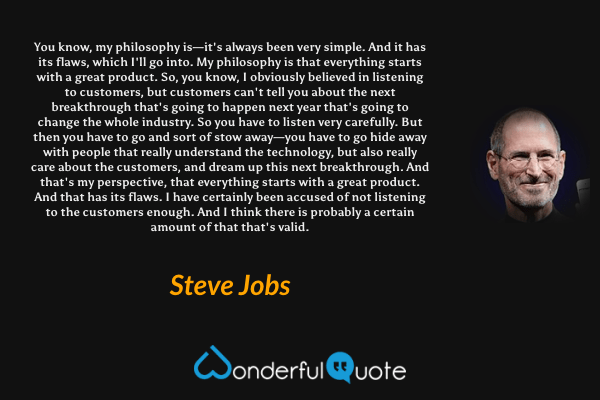
You know, my philosophy is—it's always been very simple. And it has its flaws, which I'll go into. My philosophy is that everything starts with a great product. So, you know, I obviously believed in listening to customers, but customers can't tell you about the next breakthrough that's going to happen next year that's going to change the whole industry. So you have to listen very carefully. But then you have to go and sort of stow away—you have to go hide away with people that really understand the technology, but also really care about the customers, and dream up this next breakthrough. And that's my perspective, that everything starts with a great product. And that has its flaws. I have certainly been accused of not listening to the customers enough. And I think there is probably a certain amount of that that's valid.
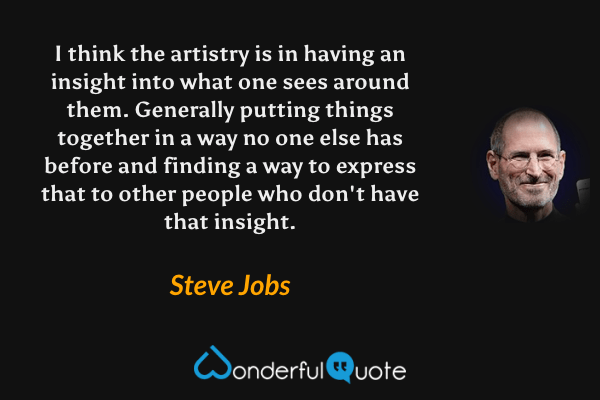
I think the artistry is in having an insight into what one sees around them. Generally putting things together in a way no one else has before and finding a way to express that to other people who don't have that insight.
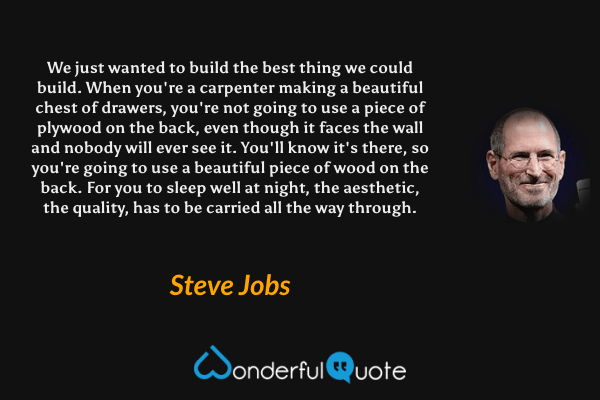
We just wanted to build the best thing we could build. When you're a carpenter making a beautiful chest of drawers, you're not going to use a piece of plywood on the back, even though it faces the wall and nobody will ever see it. You'll know it's there, so you're going to use a beautiful piece of wood on the back. For you to sleep well at night, the aesthetic, the quality, has to be carried all the way through.
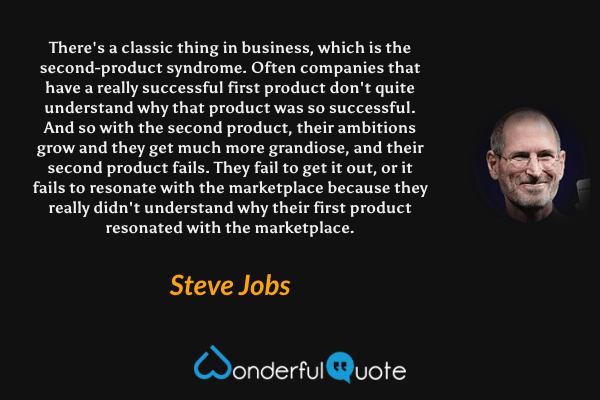
There's a classic thing in business, which is the second-product syndrome. Often companies that have a really successful first product don't quite understand why that product was so successful. And so with the second product, their ambitions grow and they get much more grandiose, and their second product fails. They fail to get it out, or it fails to resonate with the marketplace because they really didn't understand why their first product resonated with the marketplace.
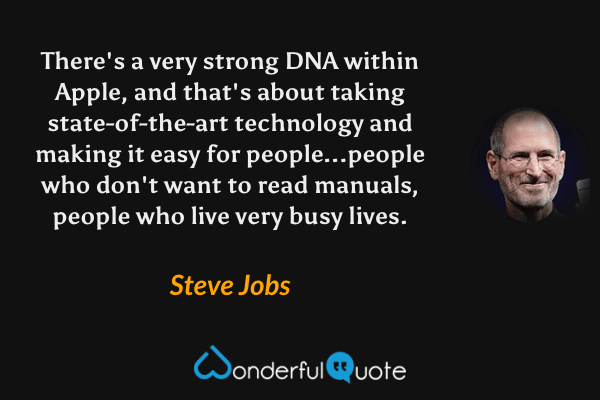
There's a very strong DNA within Apple, and that's about taking state-of-the-art technology and making it easy for people...people who don't want to read manuals, people who live very busy lives.
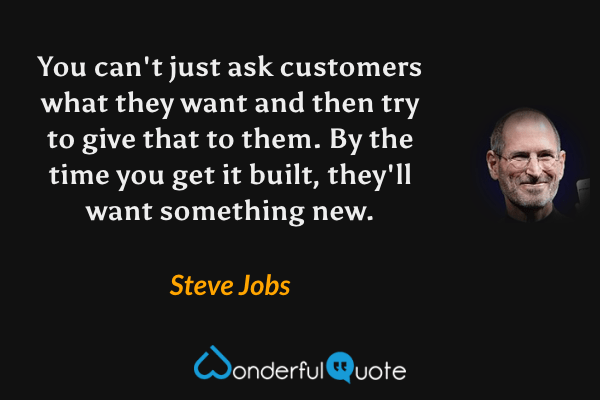
You can't just ask customers what they want and then try to give that to them. By the time you get it built, they'll want something new.
That's been one of my mantras—focus and simplicity. Simple can be harder than complex: You have to work hard to get your thinking clean to make it simple. But it's worth it in the end because once you get there, you can move mountains.
This is what customers pay us for—to sweat all these details so it's easy and pleasant for them to use our computers. We're supposed to be really good at this. That doesn't mean we don't listen to customers, but it's hard for them to tell you what they want when they've never seen anything remotely like it.
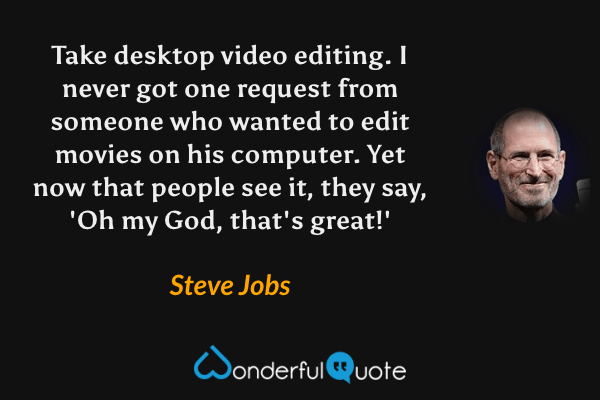
Take desktop video editing. I never got one request from someone who wanted to edit movies on his computer. Yet now that people see it, they say, 'Oh my God, that's great!'
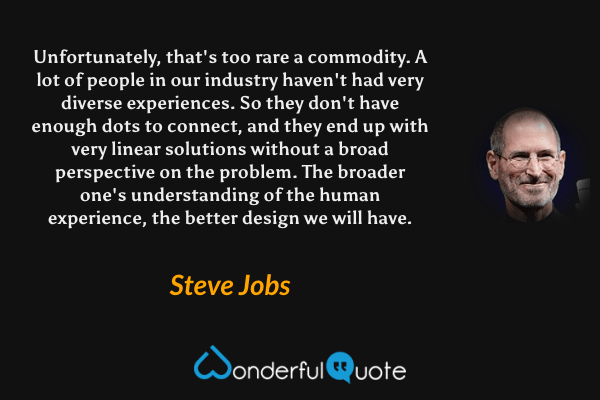
Unfortunately, that's too rare a commodity. A lot of people in our industry haven't had very diverse experiences. So they don't have enough dots to connect, and they end up with very linear solutions without a broad perspective on the problem. The broader one's understanding of the human experience, the better design we will have.
Some people are saying that we ought to put an IBM PC on every desk in America to improve productivity. It won't work. The special incantations you have to learn this time are the 'slash q-zs' and things like that. The manual for WordStar, the most popular word-processing program, is 400 pages thick. To write a novel, you have to read a novel––one that reads like a mystery to most people. They're not going to learn slash q-z any more than they're going to learn Morse code. That is what Macintosh is all about.

Not trusting the engineers' estimates and promising other teams that the work will be done sooner than the engineers agree to is one of the fastest ways to ruin your relationship with the team.

Marketing folks focus on getting users into the product, while product managers define what happens once the user is in the product.

Product managers are responsible for identifying problems and opportunities, picking which ones to go after, and then making sure the team comes up with great solutions, either by thinking of the solution themselves or by working with the designers and engineers. This is why product sense—having the intuition to recognize the difference between a good product and a bad product—is so important for product managers.

PMs who like doing customer research and market analysis could enjoy working on B2B products. These are also the products where PMs tend to exert the most influence, so they can be a very satisfying place to work.

Data-driven PMs can do very well working on consumer products because they're able to make a strong case for their proposals, and they often can come up with features that will make a difference to the core metrics the company cares about.

Because companies in online software collect more data, it's important that these PMs are skilled with data analysis and designing experiments.

PMs who are good at project management and have good communication skills do well working on shipped software. Shipped software can also be great for people who want a good work / life balance, since there aren't usually urgent issues that need to be fixed within hours.

Prioritization is one of the product manager's most important functions at this point; if the team were to fix every bug and build every new feature idea, the product would never launch. The PM needs to consider all of the new requests and decide if they should be prioritized for the current release or punted to a later time.

Ask about who you'll be working with on your core and extended team. Find out how much of your time will be spent writing specs and how much you'll be working with designers. Learn where the balance is between PMs, designers, and engineers in making product decisions.

One reason product management is such an appealing career is you get to sit at the intersection of technology, business, and design.

Pro Tip: If you have any type of subscription or recurring revenue, make sure you measure LTV (Lifetime Value— the total revenue customers spend during their relationship with your firm) by referral source(s) and by the number of visits prior to conversion.

Raising prices for your product every year or two and grandfathering in existing customers is a great way to increase loyalty and grow your profit margins. (We did this several times over the next few years; it worked like a charm.)


